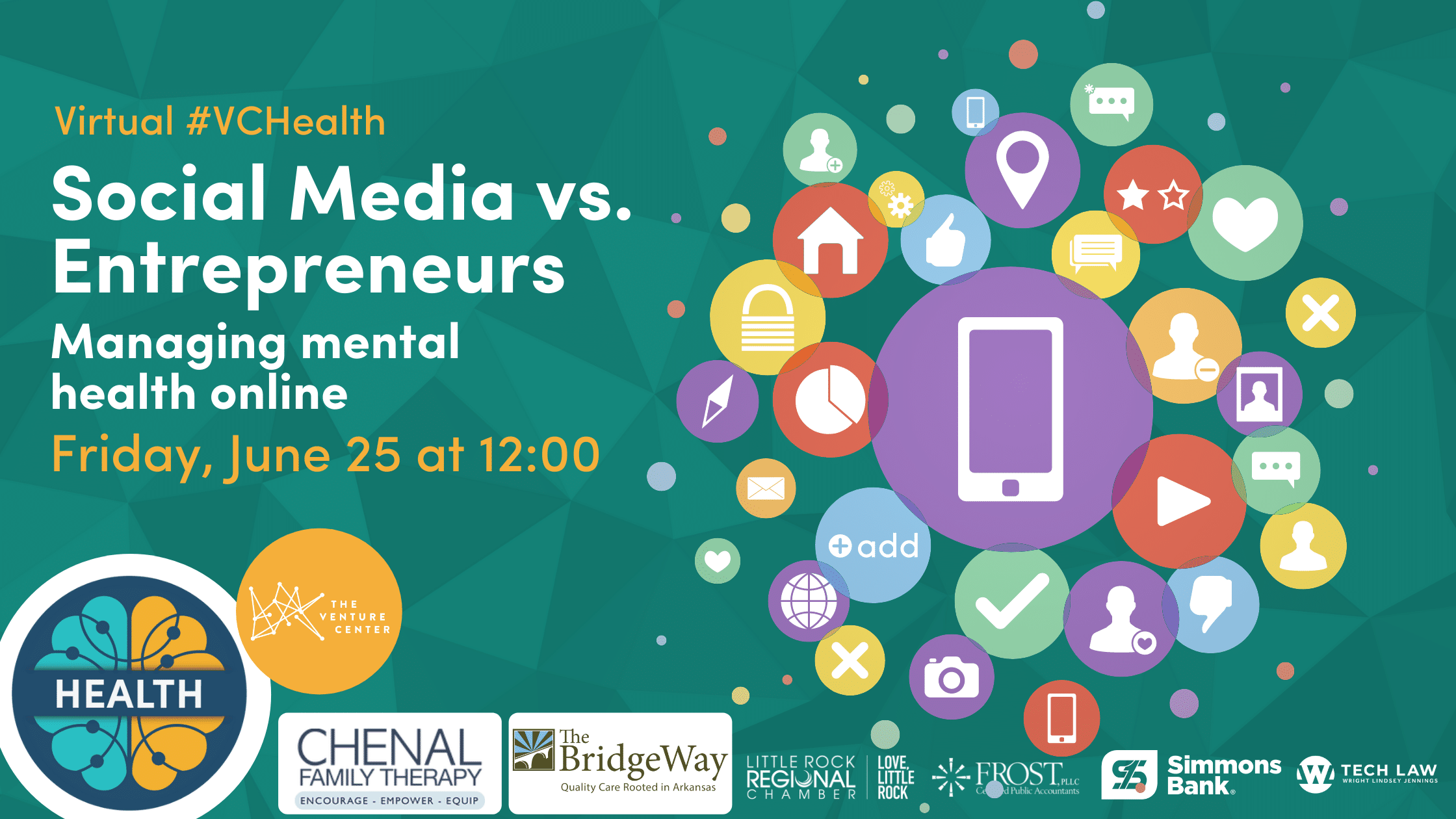Social Media and Mental Health Tips for Entrepreneurs
We know that social media can hurt your mental health. It’s a real dilemma for entrepreneurs, because for many business owners social media is key to making the business work. It can also be a great networking tool. As a result, managing social media and mental health is a huge challenge.
At our latest VC Health webinar, mental health experts Ken Clark of Chenal Family Therapy and Bruce Trimble of The Bridgeway broke down the key steps for improving mental health while using social media.
1. Use social media to document joy! Minimize negativity.
Only use social media to document the joy in life. Remember when your mom, or whoever, told you that if you don’t have something nice to say, don’t say anything at all? They were right! The things you say and post affect how you view everything in your life. Be positive on social media, and find more appropriate venues to deal with negative thoughts and feelings.
2. Ditch toxic connections! Unfollow people or brands that post upsetting content.
Control your feed by unfollowing people and businesses posting content that upsets you. That may mean certain news sites, or it may mean your aunt or uncle who posts conspiracy theories all day. It doesn’t matter. Negative content constantly flying in your face has an impact on you. You can stop seeing people’s stuff without having to stop being their friend.
3. Be mindful of your consumption. Try to reduce using social media as a time-filler.
Be deliberate about your social media consumption. Whether standing in line at the bank or passing the time waiting for a plane to take off, reflexively going to social media now to fill time is not the best for mental health. Carve out specific times for social media. Maybe it’s Saturday mornings with coffee, or it’s your Wednesday afternoon check-in. Whatever you do, do it on purpose.
4. Commit to walking away.
Have an internal rule that when things get nasty online, you will walk away. Comment sections trigger most people’s Fight, Flight or Freeze instincts! As a result, it’s just not going to end well. Plus, as entrepreneurs and creators, we want our pre-frontal cortex hard at work. Not our amygdala (aka “lizard brain”), which controls our fight, flight, or freeze instincts. Keep your amygdala calm by walking away!
5. Remember the Lincoln letter rule.
Abraham Lincoln famously wrote letters, then put them in a drawer. If he still wanted to send it the next day, he sent it. Guess what? He never sent most of those letters! Apply that principle to social media. Remember that it only takes one person catching you at your worst foot-in-mouth moment to take and post screenshots that could really hurt your business.
6. For your business – seriously – avoid politics and religion.
Or talking trash about anything, really. Remember all the work you’ve put into your brand. Making a point about Joe Biden or Donald Trump that the other side does not care about and is not going to listen to anyway is not worth putting risking your business.
7. Make sure that social media is not part of your wind-down routine at night or your wake-up in the morning.
There are two pieces of the day besides sleep itself when our brain kind of resets. That’s the 30 to 60 minutes before we go to bed, when our brain starts to shut off and we start to let go of everything. And the other of course is right after we wake up, and we’re either going to be focused or we’re going to be scattered all day. Don’t allow social media to disrupt your sleep, and don’t allow it to start your day off wrong.
8. Don’t get on social media when your relationship is in a rocky place.
Just don’t do it, trust us on this. Whatever your issues, the problem has a very real potential to be exacerbated by social media. Distractions and fantasies can become alluring and lead to big trouble. It happens all the time, and you’re better served by avoiding that kind of mess altogether.
9. Don’t unwind with social media and alcohol! One increases the use of the other in a very negative cycle.
Drinking leads to decreased inhibitions, which can lead to posting thoughts, photos, responses, and so on, that a person might not post if not under the influence. Then, of course, there are the things that cross your feed that make you feel angry, emotional, lonely, or scared. Which might prompt another drink. Which can lead to poor judgment in posting, which can lead to more scrolling, more feelings, more drinking! Then what kind of shape are you in for work the next day? NOT GOOD.
10. Business owners: standardize your responses to negative reviews.
Winging it can backfire when you’re responding in a state of defensiveness. Write out responses to negative reviews or comments and be ready to copy and paste them, or have someone less emotionally attached to the business do that for you. It’s not worth an unforced error to respond to negative comments or reviews poorly or from a place of frustration.
Thanks for reading! Check out our mental health resources page for more tools designed to help entrepreneurs, business owners, and really everybody prioritize mental health and wellness!




